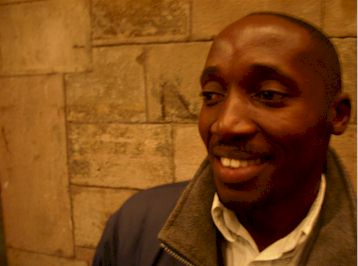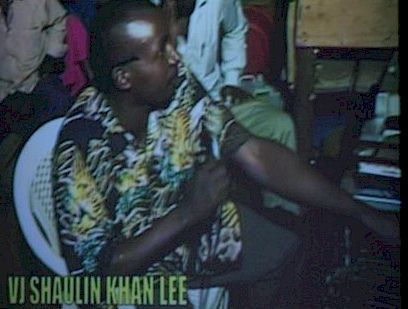___________________________________________________
Vee-jay
translators in Uganda
Interview with Prince Nakibinge Joe, president of the Union of Videojockeys/Translators
association (UVJA) and one of the most popular VJ's in Uganda.
By
Dídac P. Lagarriga, February 2007
 Nakibinge
Joe
Nakibinge
Joe
The translator VJ in Uganda is that person (mostly men, but women's
presence is increasing) who have made it a profession to translate films
into Luganda, the language most commonly spoken in Kampala and its surroundings.
What does it mean to be a video jockey in Uganda?
The VJ is like a DJ. While the DJ is who spices up music in a discotheque, and he can put things which can you move at least till morning, a VJ is also like that. He puts some jokes in the film, at the same time he translates it, at the same time he is also like an actor, because he's also acting... VJ's are the subtitles for the community, without us people cannot understand the movie. We live in the slum areas, but we can read and write, so we speak on top of the movie. We must be there. Some people in the audience looks more to the VJ than to the movie, because they see a man speaking alone for 90 minutes, or three hours, moving, narrating, exclaiming... They enjoy a lot!
When did VJ's start in Uganda?
It
started long time ago, back to 1986. At that time I came from the village
to Kampala. There weren't video halls, and all that... Around 1987 the
work began, with a 300 meters video hall where we watched movies, and
videos, paying to somebody some money to enter. By then they could not
allow younger to enter into the video halls unless you went with your
parents. In 1988 came a man, it was called Lingo, and he started the
video jockey work. I don't know where he got the idea. People could
not watch movies without him because they didn't understand. He moved
around from the front sit to the back to the front, he didn't sit down;
he was moving around all the time, telling to the audience what the
movie was about, and everything. This man was not educated and he didn't
understand English well, but he could get the story, what was the movie
about, like: "this boy buys a sweet, enters in the car..."
or he tell you that certain person is going to die... So he was not
professional at that time, but people enjoyed this. He had not machines
that you can switch off and on the sound of the movie, so he was telling
like that. So he was not translating, only describing and commentating
the movie and all of that.
Two years after that, some people decided kept on live that work and
join it and those who came they were a bit professional than him because
there was more demand, so they started to do a good work, with the machines,
and the microphones, so they could switch off and on the volume while
they were translating. They make it fun, so people enjoyed... In 1991
I had a friend, who was also a VJ, but his problem was the language,
he could not understand English very well, and most of these films are
in English (or with English subtitles). In that time I hadn't enough
to pay the school fees. I was in secondary school, and my parents could
not afford to pay it. So most of the time I spent in video halls with
my friend. You must go through the tape before you translate it to the
audience, so I was helping him: "this word means this, it's about
that..." So I assisted him until one day he could not be there,
and there was nobody to translate. There was a movie called The Ambulance
and there is where I began. So I put the movie in the deck, I got the
microphone and I started from there, without passing it first. I did
it quite well, and people enjoy it. So the following days I went to
ask for a job. I had an interview with the boss of a video hall and
he decided to employ me. I was there one year, and then I changed to
another video hall because they pay highly and had good machines and
all that. I work for that man two years.
In the beginning people didn't see you as a serious person if you were
a VJ, like a person that has nothing to do... With time people took
us seriously, so around mid 90s so many people came and enjoy our work,
and video halls were mushrooming day after day and day after day. The
government tried to avoid them because insecurity and all of that, and
because most of the people that are unemployed end in the video halls,
they spend all the time watching movies because they don't have anything
to do... The government was claiming that maybe these people could work
if they didn't spend all the time there.
It was not easy for me because I had to pay school fees for my sisters
and I wanted to go further with my studies, because you see, there are
these science fiction movies, so you must have knowledge of physics,
or chemistry to translate properly the film, or if it's a drama maybe
you must know laws, and how the court works and all of that... So I
wanted to go back to school. I was a very good footballer, and because
of that they decided to pay me half of the fees, so this is how I continued
with my education, so I end high school. I stopped there and I continued
my work as a VJ.

A video
hall in Kampala
It was then that VJ practice was becoming bigger...
Yes. In 1998 we started dubbing films, with two video decks, one plays, one is dubbing, so we translate it and it was recorded. We did copies and we put them in the video library, so people could come and rent them. In Kampala alone there are more than 500 video halls! Video halls are mushrooming and they can not have live VJ's in all of them, because it's not easy for people to work as a VJ. Is not an easy work, so we start to coming up with the video libraries. They who could not afford to buy the movies, they could rent them... There's also some Vee-Jay Slams, competitions with thousands of audience and ten or twenty VJs performing. In Kampala we have the Amakula International Film Festival (www.amakula.com), a meeting of talent, and this kind of events help us a lot.
Always Hollywood films?
We had some Africans films too, but just a few, like The raise and fall of Idi Amin, the Uganda's dictator. Some movies from South Africa and Nigeria too. We had movies from Europe like James Bond 007, a lot of Asian movies. People enjoy Asian movies, of kung-fu, Chinese and Japanese... And Bollywood, and from South America, too, they like a lot the films from around the world. We have also different types of translations in relation to the various types of audiences: Religious, fiction, political...

Where do you find the movies?
There are some big libraries in town owned by Indians, but in these days there are so, so, so, so many libraries, and almost every shop has movies, because the new technologies, duplicating DVD's and VCD's, and people now can afford to buy TV sets and all of that. Some VJ's are ripping big, they are getting money. So one can buy their machines and put his own video hall or a video studio, so he makes a lot of money with the copies.
Have you got legal problems with copy rights and all of this?
Yes,
in 2002 we came up with an idea of forming some associations, because
the government disturbs us. Is not a legalized job and we are not licensceable
and the broadcasting companies they want to come in, because we should
pay license for broadcasting. So we form several organisations. One
is called Union of film operators and owners association, another one
is United video operators and owners association... In 2005 we came
with Union of Videojockeys/Translators association (UVJA). I'm the president
of that one, and we have around one hundred members. With this organisation
we form also young people in the skills of translating, for example
in how you must translate such hard words like "motherfucker"
or things like that. We recommend also to not just translating actions
like a footballer commentator. Some are specialized in horror, others
in drama, or kung-fu...
We also try to open the marked of our products in our neighbouring countries,
like Kenya. The grow of a VJ continues to expand with many of them selling
translated movies to as far as Kigali (Rwanda), Lwanda, board areas
of Kenya where people can speak and hear Luganda, neighbouring parts
of Congo and Tanzania. We want to educate our members in several languages
like Swahili, Arabic, French... for reach and to promote the Film Industry
and to widen the movie market in East and Central Africa.
Do you know more VJs in other countries?
No. We just know that there are two in Ethiopia and one in Sudan... And three hundred in Uganda!
__________________________________________
oozebap . 2007 . index